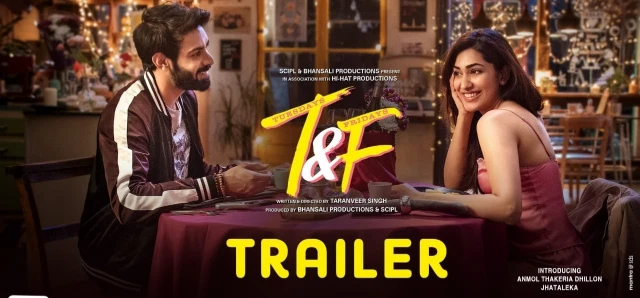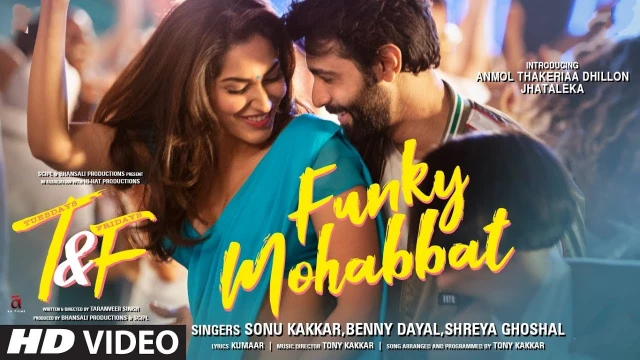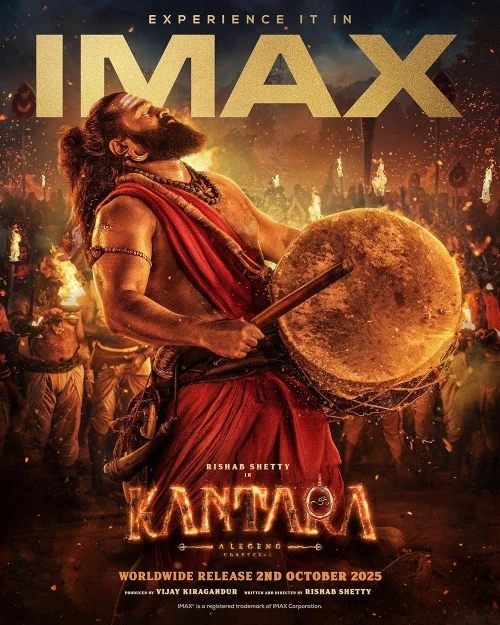Read a detailed review of Tuesday and Friday movie. Explore its storyline, cast performances, direction, music.
🎬 Introduction to Tuesday and Friday
“Tuesday and Friday” offers a fresh take on modern romance, mixing youthful energy with contemporary storytelling. Directed by Taranveer Singh and produced by Sanjay Leela Bhansali, the film tells an urban love story for today’s generation, who often juggle commitment and independence. Unlike typical Bollywood romances, this film breaks away from clichés, exploring relationships with clear boundaries and rules. It shows a world where two people meet, fall in love, but also set terms that make their relationship unique. The title itself hints at the quirky idea—the couple only meets on certain days, leaving the rest of the week for personal freedom. This interesting concept caught viewers’ attention and sparked conversations about modern love.
The movie stars Anmol Thakeria Dhillon and Jhataleka Malhotra in their first roles, launching fresh talent into the industry. With Bhansali’s name attached, expectations were high, and the film created quite a buzz among younger viewers. Its sleek look, stylish editing, and relatable dialogues make it a modern watch, especially for millennials and Gen Z, who often prefer experimental love stories over the traditional ones. The chemistry between the leads is the film’s main draw, keeping audiences interested despite some script flaws. Combining glamour with emotional depth, the film aims to appeal to many viewers looking for relatable yet inspiring stories.
📝 Movie Storyline
At the center of “Tuesday and Friday” is an unusual love agreement. Varun (Anmol Thakeria Dhillon) and Sia (Jhataleka Malhotra) decide to be in a relationship where they only meet on Tuesdays and Fridays, giving each other full freedom on other days. This unique setup drives the story’s conflict and charm. The film explores how feelings like attraction, jealousy, and love grow within these limits. What starts as a fun, casual relationship becomes complicated as emotions deepen, challenging their agreement. The audience wonders: can such a deal survive real feelings, or will it fall apart under the weight of growing attachment?
Set in London, the story uses a cosmopolitan backdrop that fits its modern theme. The glamorous locations, trendy fashion, and chic lifestyle reflect the characters’ personalities, making the film visually attractive. The writing mixes humor, witty dialogue, and heartfelt moments, balancing lightness with emotion. While the idea feels new, it also mirrors real challenges faced by young couples today who want love but also value independence. By showing the balance between commitment and individuality, the story touches on a universal struggle that many modern viewers relate to and sparks thoughtful discussions about love’s changing nature.
⭐ Cast and Performances in Movie
The cast plays a key role in the film’s charm. Anmol Thakeria Dhillon, son of actress Poonam Dhillon, makes a confident debut as Varun, bringing a natural and easy performance. He shows both the playful and sensitive sides of his character well, signaling promise as a new talent. Jhataleka Malhotra, former Miss India International, delivers a graceful performance as Sia. She portrays a modern, independent woman who values her freedom but can’t ignore her feelings. Their chemistry is the film’s backbone, keeping viewers hooked. Together, they bring fresh energy to Bollywood’s romantic scene, which often relies on established stars.

Supporting characters add humor and depth to the story, making scenes lively. Though the film mainly focuses on the leads, the ensemble cast keeps things dynamic. The new pairing of Anmol and Jhataleka was a highlight, giving audiences a chance to see two newcomers earnestly making their mark. Their screen presence, supported by stylish direction, makes the film visually appealing even when the script slips. Their debuts are well-planned to leave viewers curious about their future work.
🎥 Direction and Cinematic Style of Tuesday and Friday
Director Taranveer Singh deserves praise for trying a fresh story in Bollywood’s romance genre. With “Tuesday and Friday,” he creates a sleek, stylish film that connects with urban viewers. Choosing London as the setting adds to the film’s modern vibe, and the glossy cinematography captures the city’s elegance. The visual appeal is a strong point, with well-composed shots, trendy costumes, and bright colors that reflect youthfulness. By focusing on style and modern tastes, Singh presents a version of love that feels both aspirational and relatable, drawing in the audience effectively.
Singh balances humor and emotion skillfully. While the script could have been deeper in places, his direction keeps the pace lively, never letting the film drag. He also gets real performances from the leads, which is impressive for their first film. The mix of Bhansali’s production quality and Singh’s fresh approach results in a film that feels relevant today, even if it doesn’t completely change the genre. His work shows Bollywood can try new stories while still keeping mainstream viewers interested, a tough balance for early directors.
🎶 Music and Background Score in Movie
No Bollywood film feels complete without music, and “Tuesday and Friday” embraces this tradition well. The soundtrack, created by various artists, includes both lively songs and soulful melodies. Tracks like “Ashiq Tera” and “Tera Mera” stand out, capturing the film’s romantic spirit and appealing to younger listeners. The music videos, filmed in beautiful London spots, add to the songs’ charm. The soundtrack was made to connect with young audiences who enjoy catchy tunes as much as meaningful lyrics.
The background score fits the story nicely, especially in emotional and romantic scenes. It adds rhythm and keeps the film’s youthful energy going. While the music may not be groundbreaking, it serves its purpose by keeping the story engaging. For many, the music is one of the film’s most memorable parts. In Bollywood, songs often outlive the movie, and “Tuesday and Friday” benefits from this tradition, offering tunes viewers might keep humming long after the film is over.
💡 Themes and Messages in Tuesday and Friday Movie
At its heart, “Tuesday and Friday” is more than just a love story — it’s a look at modern relationships. The film explores the balance between love and freedom, a theme that hits home for today’s generation. It asks questions about commitment, emotional limits, and how romance is changing in the digital age. By showing a relationship based on a special agreement, the film highlights how people redefine love on their own terms. This storytelling invites discussion about whether unconventional choices can work alongside deep feelings.
The message is clear and timely: relationships aren’t one-size-fits-all. The Tuesday and Friday setup may seem unusual, but it reflects how couples today try new ways to stay connected while keeping their individuality. The film encourages open talks about love, trust, and personal space, making it more than a typical romantic comedy. Though not perfect, its themes leave viewers thinking about their own views on love and commitment. In this way, it captures the spirit of a generation caught between tradition and modern change.

🌍 Setting and Locations in Tuesday and Friday
The setting of “Tuesday and Friday” is one of its best features, adding a unique touch to the story. Mostly filmed in London, the movie captures the city’s lively, cosmopolitan feel and uses its beautiful spots to match the story’s glamor. From trendy cafes and busy streets to quiet parks and famous landmarks, every location is chosen to reflect the lead characters’ personalities. London isn’t just a backdrop; it’s a key part of the movie’s charm, symbolizing modern life, independence, and an aspirational lifestyle. This setting lifts the story beyond a typical love drama and places it in a global context, fitting the film’s focus on young, international viewers.
The cinematography highlights shiny, stylish scenes that appeal to young audiences. By mixing luxury apartments, lively nightlife, and vibrant public places, the visuals bring out the cosmopolitan feel of the relationship. This thoughtful choice of locations makes the unusual love story feel believable and relatable. The setting shows how place and story can work together to create an atmosphere that reflects the challenges and joys of today’s couples. Viewers, especially younger ones, can easily picture themselves having similar conversations in such a setting, making the film’s world engaging and inspiring.
📖 Screenplay and Writing of Tuesday and Friday Movie
The screenplay of “Tuesday and Friday” plays a big role in holding its experimental idea together. Written to appeal to modern tastes, it balances witty talk, humor, and emotional dialogue. The writing introduces characters clearly and keeps the story moving quickly, keeping audiences interested. By setting rules and limits in the relationship, the screenplay creates ongoing curiosity: how will the characters manage their feelings within these boundaries? This keeps the story fresh and tense right up to the end.
Though strong in many ways, the writing sometimes falls into familiar patterns that might feel repetitive to frequent movie watchers. Still, what makes it stand out is its honest attempt to show love in a different way. The dialogues feel current and reflect the kinds of talks younger couples have, making it easy to relate to. The screenplay keeps humor close at hand, balancing emotional moments with lightness. By making the characters sound real, the writing creates moments where viewers can see parts of their own relationships on screen, which strengthens the film’s impact.
🎭 Character Development in Tuesday and Friday Movie
Character development is key to making the audience care about the story in “Tuesday and Friday.” Varun, played by Anmol Thakeria Dhillon, starts as a playful and confident young man who enjoys the freedom of a non-traditional relationship. But as the story goes on, he shows a deeper emotional side and vulnerability when dealing with love’s challenges. This growth helps viewers connect with him. Sia is introduced as a strong, independent woman who values her space but gradually realizes her deeper feelings. Her journey highlights the struggles modern women face balancing freedom and commitment.
The film does a good job showing how the two leads’ relationship changes over time. It’s not fixed; it grows as they deal with jealousy, attachment, and trust. The small changes in their personalities reflect the real emotions in unconventional relationships. The supporting characters, though few, add contrast and help define the main characters better. By focusing on these changes, the film makes the love story more than just surface-level attraction. It explores how people grow and change with emotional challenges, giving the story a depth that viewers can relate to personally.
🎞️ Cinematography and Visuals in Tuesday and Friday Movie
The cinematography in “Tuesday and Friday” is a big part of what makes the film look good. The shiny, stylish shots and bright colors add energy to the story, making even simple scenes feel glamorous. Cinematographer Arkesh Ajay beautifully captures London, using wide shots to show its scale and close-ups to capture the characters’ feelings. Every frame seems carefully planned to match the sleek, modern tone of the story. This attention to detail makes the film feel polished and trendy, meeting the expectations of younger viewers.
Natural light in outdoor scenes combined with colorful neon shots at night shows the dual nature of the characters’ journeys—fun yet emotional, modern yet dealing with timeless issues. The film’s look works well with its music, creating a strong and unified style. Even when the story falters, the visuals keep viewers interested, proving that great cinematography can lift a film. Mixing stylish images with heartfelt moments makes the movie a full sensory experience. For many, its polished look is a big reason it leaves a strong impression.
🎯 Audience Reception of Tuesday and Friday Movie
The reception of “Tuesday and Friday” was a mix of interest and criticism. Younger viewers, especially millennials and Gen Z, found the concept fresh and relatable. The idea of a relationship built around personal freedom connected with those looking for new ways to approach love. The film’s stylish look, upbeat music, and realistic conversations helped it find a small but loyal audience. Social media buzzed about its quirky idea and the fresh lead actors, helping it stand out in a crowded Bollywood scene.
Not all feedback was positive, though. Some critics felt the story lacked depth and relied too much on style over substance. Still, many recognized the film’s effort and ambition to move away from traditional romance themes. The response showed a generational gap: older viewers doubted the concept’s realism, while younger audiences accepted it as reflecting their lives. In the end, the movie succeeded in sparking discussions about modern love, no matter if people agreed with its take or not.
🏆 Legacy and Impact of Tuesday and Friday Movie
“Tuesday and Friday” may not have been a box office hit, but its impact lies in the conversations it started about love and freedom in relationships today. As the first film for both lead actors, it introduced them as new talents to watch. It also added to Bollywood’s growing list of movies that explore love beyond traditional stories, helping shift how love stories are told. Though not perfect, its ambition and stylish execution make it a notable part of the changing film scene.
The movie’s legacy is also in its appeal to young people who want stories that reflect their real lives. By showing love as flexible and personal, it fits with a generation rethinking what commitment means. Its themes of individuality, freedom, and changing emotional bonds continue to connect with viewers long after the movie ends. While it might not be remembered as a blockbuster, its role in pushing Bollywood toward new kinds of stories secures its place in the film world.
Also Visit



